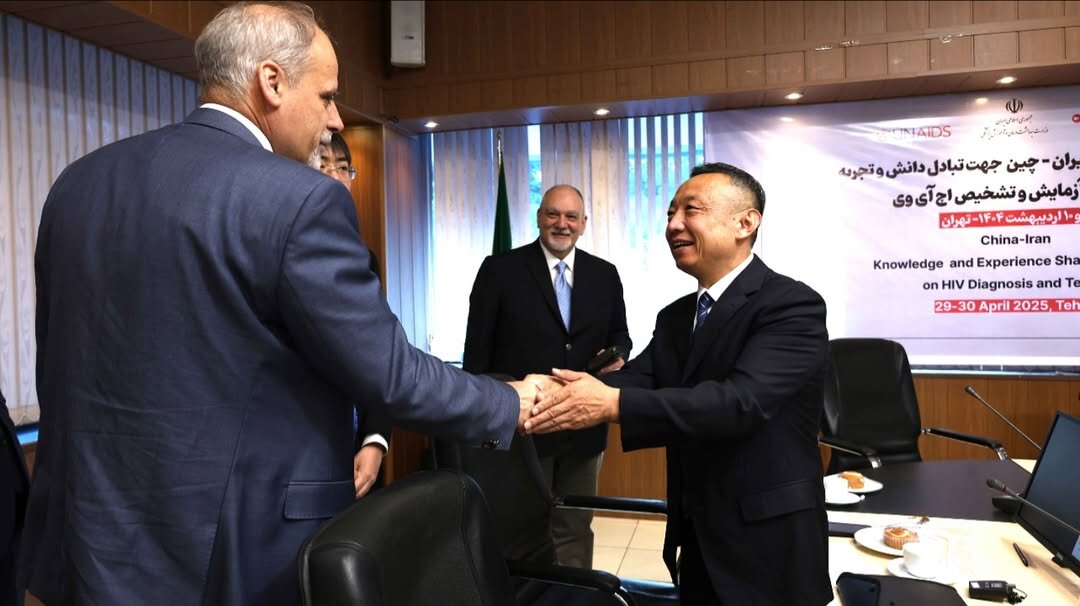China, UNAIDS to help Iran boost HIV rapid response

TEHRAN – In an effort to enhance the overall resilience of Iran’s national AIDS program and HIV testing capacity, Iran’s Health Ministry, the China International Center for Economic and Technical Exchanges (CICETE), and the Joint United Nations Program on HIV/AIDS (UNAIDS) have convened a meeting to share expertise.
The two-day knowledge and experience-sharing meeting took place in Tehran on April 29-30, focusing on accelerating Iran’s HIV response.
This multi-stakeholder engagement brought together more than 30 experts from the two countries and UNAIDS to explore pathways to establishing a domestic manufacturing capacity for HIV rapid diagnostics, which represents a sustainable pathway to eliminate the HIV testing gap in Iran.
This meeting was organized within the framework of a Joint Agreement signed between CICETE and UNAIDS in April 2024, funded by China’s voluntary financial support within the South-South Cooperation framework.
The agreement, which is in line with the priorities of Iran’s National AIDS Control Program and China’s Global Development Initiative, combines supply chain, capacity development and knowledge exchange solutions to strengthen an important pillar of Iran’s national HIV response, namely knowledge of HIV status, the first of the global 95-95-95 targets. This “first 95” is the key to controlling Iran’s HIV epidemic.
The first of the United Nations’ 95-95-95 targets to end the HIV epidemic is for 95 percent of people living with HIV to know their HIV status by 2025. HIV testing is therefore essential to achieving “the first 95”.
Setting the tone for the rich discussion were opening remarks from the UN Resident Coordinator in the Islamic Republic of Iran, Stefan Priesner; the UNAIDS Regional Director for the Asia-Pacific and Eastern Europe and Central Asia regions, Eamonn Murphy; the Deputy-Director of China’s National Center for STD/AIDS Prevention and Control (NCAIDS), Xu Peng; and the Advisor on International Affairs to Iran’s Deputy-Minister of Health, Mohammad-Reza Rahbar.
This project not only manifests many of the core values of multilateralism but also paves the road for further collaboration between the I.R. Iran, the People’s Republic of China, and UNAIDS in the field of HIV and health.
It falls squarely within the framework of biomedical and scientific cooperation between the two countries, announced by Iran’s Minister of Health and Medical Education, Mohammad Reza Zafarqandi, during his recent official trip to China.
National HIV testing campaign
In November 2024, the health ministry conducted a month-long national HIV testing campaign to raise public awareness and identify cases of the disease.
With the theme of ‘I will take HIV test, too’, the campaign started on November 10 with two main objectives, the health ministry’s website reported.
First, since early diagnosis is important as it allows for the timely initiation of treatment, the campaign aimed to encourage individuals to take the test to detect HIV/AIDS infection among key populations.
The second main objective was to provide educational programs in community settings like city centers and parks to raise public awareness about HIV.
Human immunodeficiency virus is a virus that attacks the body’s immune system. It targets the body’s white blood cells, weakening the immune system. This makes it easier to get sick with diseases like tuberculosis, infections, and some cancers. Acquired immunodeficiency syndrome (AIDS) occurs at the most advanced stage of infection.
Despite all the measures taken in the country so far, there are still many challenges to be addressed. One of the main challenges is the lack of HIV-detecting programs to address the spread of the disease.
UNAIDS
The Joint United Nations Programme on HIV/AIDS (UNAIDS) leads and inspires the world to achieve its shared vision of zero new HIV infections, zero discrimination, and zero AIDS-related deaths. UNAIDS unites the efforts of 11 UN organizations—United Nations High Commissioner for Refugees (UNHCR), United Nations Children’s Fund (UNICEF), World Food Program (WFP), United Nations Development Program (UNDP), United Nations Population Fund (UNFPA), United Nations Office on Drugs and Crime (UNODC), UN Women, International Labour Organization (ILO), United Nations Educational, Scientific and Cultural Organization (UNESCO), World Health Organization (WHO), and the World Bank— works closely with global and national partners towards ending the AIDS epidemic by 2030 as part of the Sustainable Development Goals.
MT/MG
Leave a Comment